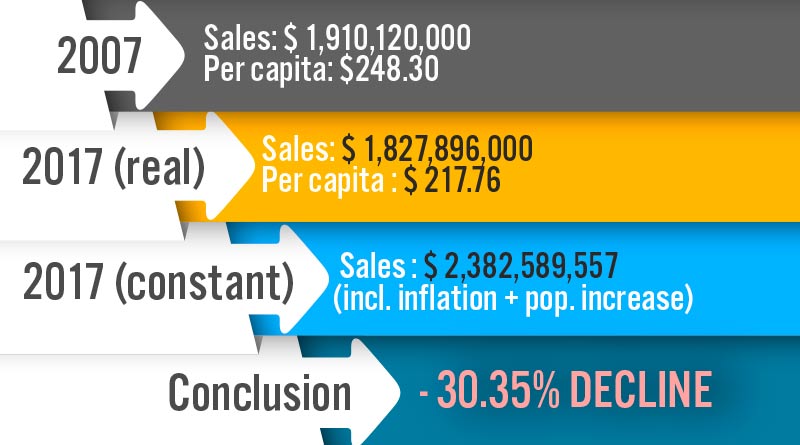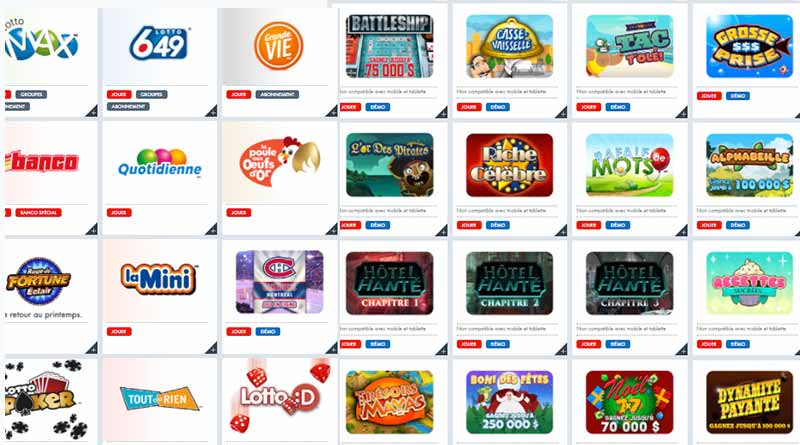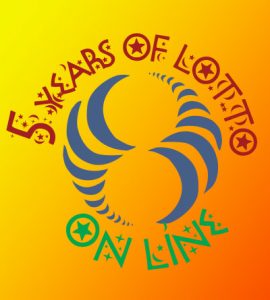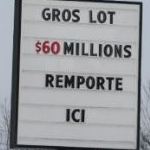Part 1 – Quebec Lotteries: General Decline, Explosion Online
It’s been over five years now since Loto-Québec started selling online lottery, a move that initially sparked great concern among retailers.
So five years later, where are we? As part of our SPECIAL FEATURE LOTO-QUÉBEC, FIVE YEARS OF LOTTERY ONLINE, DepQuébec takes a deep look at the phenomenon throughout the week to assess its various impacts on brick-and-mortar retailers.
Today, in the first part of this series, we look at the explosion of online sales.
Yes it’s true, you’re right: at still around 2%, they are still quite modest compared to in-store lottery sales.
But don’t be fooled by appearances.
While in-store sales in general have been struggling over the past 10 years in Quebec, online sales are experiencing a meteoric rise of nearly 40% per year and this, for the past three years.
And all signs tend to show that this trend is accelerating … quite seriously!
The slow decline of lottery sales
Some may be surprised to hear it but lotteries in Quebec are in decline. A slow but steady decline.
The problem is simple: people aren’t buying as much as they used too, period.
Loto-Québec uses a polished language when talking about a “mature” market, but when you look hard on the numbers, it is rather a widespread and merciless decline that we are witnessing.

Online lottery sales in full swing
But while lotteries in generally are going down, those sold online have the wind in their sails.
After digging quite extensively through pages of Loto-Québec’s annual reports over the past five years, DepQuébec has finally been able to crunch online lottery sales figures since 2012, figures that were validated by Loto-Québec but were never clearly been disclosed per se, since the corporation would rather stick to total online sales (casino and lottery), to casino sales or sometimes, provides a figure here and there, but no clear table.
What they show basically is an incredible growth of sales: on average, they have increased quite spectacularly by 37% year over year over the past three years.
EXCLUSIVE: REVENUES FROM LOTO-QUÉBEC ONLINE SALES SINCE 2012 (in $ Million)
online sales | |||||
|---|---|---|---|---|---|
| 2012-2013 | |||||
| 2013-2014 | |||||
| 2014-2015 | |||||
| 2015-2016 | |||||
| 2016-2017 | |||||
| 2017-2018 (6 months only) | |||||
FROM 2014-17 |
As seen in the table above:
- Online lottery sales totaled $ 146.1 million since their launch in August 2012, including the first two quarters of the 2017-2018 fiscal year;
- Over the last three years (2014-2017), their growth has been stronger than online casino gaming sales, with the proportion of lotteries over total sales increasing from just over one-third to almost half of all online sales;
- For the current year – based on the first two quarters – there is a marked acceleration in online lottery sales of around 45%, slightly higher than online casino games (40%) for total sales up 42%. Total online sales are almost certain to reach six figures this year for the first time, or even break the $ 125 million mark at the end of Loto-Québec’s fiscal year.
- In fact, over the first six months of its current financial year, Loto-Québec has made the equivalent of 30% of all online lottery sales so far since it started five years ago.
One of the factors that can explain the rise of online lotteries is the fact that Loto-Québec has continued to add on its online lottery offering by migrating all of its lottery products as well as scratchers: there are currently 59 various products available on the espacejeux.com site at the moment! No one is missing: Gagnant à Vie, Scrabble, La Poule aux Oeufs d’Or, Wheel of Fortune, etc.

The online availability of such products already allowed customers to win significant prizes.
Loto-Québec’s online gaming site has enabled a resident of Chaudière-Appalaches to win $ 403,380 for Le Lutin chanceux. – Loto-Québec, 1st quarter 2016-2017 report, p. 3
These sales remain, it is true, very low compared to the $ 1.8 billion in total lottery sales currently conducted in real physical stores, a mere 2.2% of the total. But these figures are misleading given the current strong increase.
To appreciate how, we have projected the current sales amounts in the future following the assumption of an average increase of 37% per year, which we have seen for the past three years.
As can be seen in the following table, in such a scenario, online lottery sales could rise to extremely high levels by 2026, less than ten years from now!
PROJECTION OF LOTTERY SALES ONLINE AT A 37% ANNUAL INCREASE RATE
Thus, in just five years, in 2022, online sales could already amount to several hundred million dollars if the trend continues!
And based on Loto-Québec’s two most recent quarterly reports, the growth of online lotteries has accelerated considerably since last spring:
- 1st quarter (April 1 to June 26, 2017): + 51.3% – source: here, page 8.
- 2nd quarter (June 27 to September 25, 2017): + 42.9% – source: here, page 9.
We are already at $ 33.2 million in revenue in mid-year, excluding the holiday season, which suggests a record year. And lotteries also seem to pull casino game sales up.
Could this be explained in part by the introduction of a new product called Argent Web? We will address this question tomorrow and Wednesday.
A cannibalism effect?
In the event that sales break records and continue to skyrocket, the crucial question for retailers is whether these hundreds of millions of extra dollars will add to the current pie or will simply be taken from in-store sales, constituting merely a transfer from store sales to internet sales. In other words: will online sales increase provoke an in-store sales decrease?
On this topic, opinions are divided.
Currently, online sales are too small to provide any clue, since any variation could be linked to a multitude of factors.
It’s a bit the same elsewhere in North America, where the phenomenon is still very recent.
In British Columbia, the PlayNow.com platform, launched well before Loto-Québec’s, is also experiencing a strong increase in sales, which is currently double that of Loto-Québec, or about $ 158 million. Over there, in-store lottery sales have remained so far roughly above the $ 1 billion mark (source: here) except for one year. But as BCLC’s annual report reminds, lottery sales may vary depending on whether or not there have been large jackpots, so it will likely take several years before any conclusions can be drawn.
In the five or so US states, such as Illinois, where online lottery has been implemented, there is an insistence to say that online lottery sales should generate their own distinct customer base that may never have bothered to go buy a lottery ticket in store.
A younger audience?
All experts, however, seem to agree on one thing, namely that the online lottery product will no doubt better reach a younger adult customer base that is generally much more comfortable with new technologies.
According to Scott Bowen, the former commissioner of the Michigan Lottery who oversaw that state’s online expansion, “iLottery is not a threat to retail lottery sales, in fact it enhances it.” He points out that online lottery attracts younger players who are probably not already playing the lottery and makes the lottery “relevant in the lives of more people.”
“Those people, he said, were not buying lottery tickets previously and therefore the retailers would not be losing their business.” – Scott Bowen, quoted here.
Kentucky Lottery spokesman Chip Polston agrees.
“Our customers are aging: to sustain lottery revenue, we need to attract the younger audience, which tends to be mobile and has extensive access access to technology and personal devices.” – Kentucky Lottery, quoted here.
However, this is not the opinion of a coalition of retailers in Massachusetts, fighting tooth and nail to prevent the legislature to allow the sale of lottery online in this state.
Called “Save Our Neighborhood Stores”, the coalition of six retail associations argued that brick-and-mortar retailers who sell lottery tickets fuel the success of the Massachusetts Lottery and in turn benefit from foot traffic from players. Allowing the Lottery to move online would destroy small businesses and threaten the Lottery’s success, the coalition said.
“The introduction of iLottery will decimate foot traffic in their stores and present numerous other challenges to the already struggling business owners. Convenience stores are the heart of communities,” the coalition wrote in testimony prepared for the Joint Committee on Consumer Protection and Professional Licensure. “Convenience owners develop strong and unique ties to their customers and to their neighborhoods. However, the reality is that these retailers will not be able to sustain any more hits to their profits and dark, empty store fronts could soon replace our friendly, familiar neighborhood store.” – Source: here.
Tomorrow, in part # 2 of our Special Online Lottery Feature, we will see how Loto-Québec first appeased retailers by granting them fullproof commissions on online sales to finally withdraw everything for something else.







